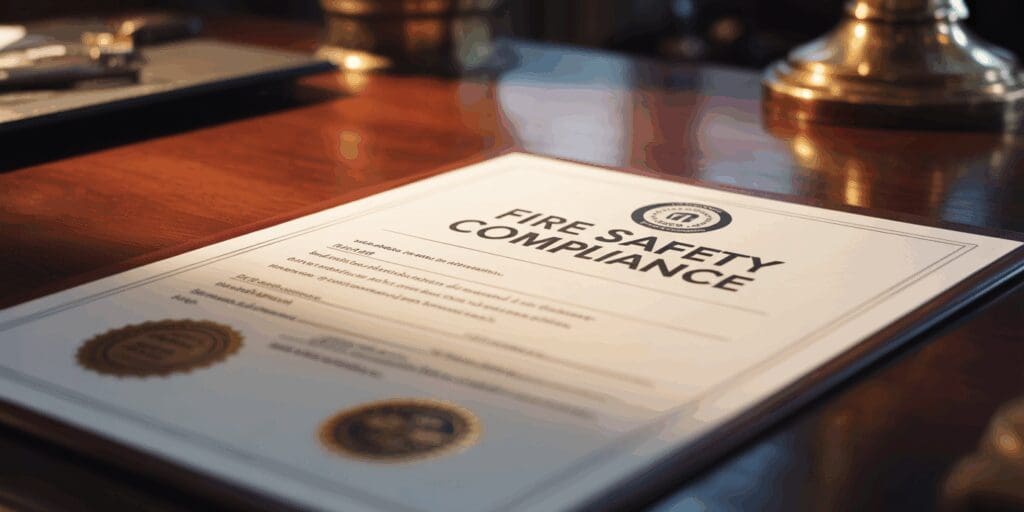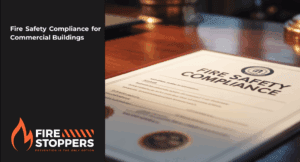Fire safety liability in Ireland operates under a complex legal framework establishing duties and responsibilities for various parties involved in building ownership, management, and occupancy. Understanding these legal obligations is essential for compliance with Irish fire safety legislation.
Table of Contents
Legal Framework

Fire safety liability operates under comprehensive legislation, primarily the Fire Services Act 1981 as amended, the Building Control Acts, and associated regulations including Building Control Regulations and Fire Safety in Places of Work Regulations.
The Fire Services Act 1981 remains the cornerstone of Irish fire safety law, establishing fundamental duties for building owners and occupiers while empowering fire authorities with enforcement powers. The Building Control Acts establish technical standards and certification requirements for fire safety installations.
Absolute liability applies in certain circumstances, meaning compliance failures result in legal consequences regardless of the defendant’s knowledge or intention. This strict approach reflects the serious public safety implications of fire safety breaches.
Parties with Legal Responsibilities
Building Owners and Landlords
Under the Fire Services Act 1981, building owners bear primary responsibility for fire safety compliance. Their statutory obligations include:
- Maintaining fire safety systems in working order
- Providing adequate means of escape
- Conducting required inspections
- Ensuring compliance with fire safety certificates
- Maintaining structural fire protection measures
Absolute liability means owners cannot claim ignorance as a defense. Case law consistently upholds this strict standard, with courts finding statutory duties create an obligation of result, not merely effort.
Property Management Companies
Management companies assuming operational control acquire independent legal duties that cannot be discharged through contractual arrangements alone. Courts have established these duties exist independently of contractual relationships with property owners.
Responsibilities encompass day-to-day maintenance, inspection coordination, contractor management, and protocol compliance. Irish tort law recognizes that professional expertise creates heightened obligations rather than reduced liability exposure.
Contractors and Fire Safety Professionals
Contractors bear professional liability governed by statutory duties and common law negligence principles. This encompasses installation to required standards, proper maintenance and testing, accurate certification, and ongoing regulatory compliance.
Fire safety consultants carry liability for recommendations, designs, and certifications extending throughout system operational life. Recent developments expand liability to third parties relying on certifications, even without direct contractual relationships.
Professional indemnity insurance requirements often exceed several million euros for complex projects. Contractors lacking appropriate qualifications or insurance face enhanced personal liability exposure.
Tenants and Occupiers
Building occupiers have specific duties under the Fire Services Act 1981 creating both criminal and civil liability exposure. These include not interfering with equipment, maintaining clear escape routes, following procedures, and reporting defects.
Commercial tenants face enhanced obligations where business activities create additional fire risks or building modifications affect fire safety performance.
Criminal vs Civil Liability

Criminal Liability
Criminal prosecutions provide for substantial penalties including:
- Unlimited fines in cases involving death or serious injury
- Imprisonment for individuals including company directors
- Personal liability that cannot be discharged through corporate structures
- Prosecution by the Health and Safety Authority
Criminal liability operates on strict liability principles requiring no proof of mens rea for certain offenses. Corporate liability extends to systemic failures in organizational oversight. Directors face personal liability when offenses occur through their consent, connivance, or neglect.
Civil Liability
Civil liability focuses on compensation and damages including personal injury claims, property damage, loss of income, and insurance recovery actions. Courts apply balance of probabilities standard, making liability easier to establish than criminal cases.
Multiple theories apply including negligence, breach of statutory duty, occupiers liability, and professional negligence. Damages in serious cases can reach millions of euros, particularly involving multiple fatalities or serious injuries.
Civil proceedings operate independently of criminal matters with different limitation periods and can continue years after criminal conclusions.
Insurance Considerations and Policy Requirements
Property insurance policies contain extensive fire safety compliance requirements. Standard policies may exclude coverage entirely for claims arising from non-compliance, even where the breach didn’t directly contribute to damage.
Coverage may be voided if statutory duties aren’t met, exposing owners to full financial consequences. Public liability coverage faces particular scrutiny in serious breach cases, with insurers arguing non-compliance constitutes intentional conduct outside policy coverage.
Professional indemnity policies contain similar exclusions for work outside qualification scope. Multiple policy interactions can create coverage gaps exposing unlimited personal liability.
Compliance Standards and Professional Requirements

Documentation and Record Keeping
Irish fire safety legislation requires comprehensive records of inspections, maintenance, testing, and remedial actions. Documentation must include specific details like dates, findings, remedial actions, and personnel qualifications.
Courts hold that inadequate record-keeping constitutes evidence of systematic failures even where equipment functioned properly. Absent documentation creates adverse inferences regarding overall fire safety management.
Professional Qualifications and Standards
Engaging qualified certified professionals has become essential. Requirements vary by fire safety work type, with different schemes for alarms, sprinklers, emergency lighting, and compartmentation testing.
Using unqualified or inadequately insured contractors transfers liability to property owners. Professional indemnity requirements have increased substantially, with minimum coverage often exceeding several million euros.
Regulatory Oversight
The Health and Safety Authority and local fire authorities maintain comprehensive oversight through scheduled inspections and responsive investigations. Powers include immediate premises access, system examination, personnel interviews, and enforcement notice authority.
Prohibition notices can immediately prevent building use until deficiencies are remedied, creating significant business disruption. Recent developments emphasize systematic proactive management rather than minimum technical compliance.
Legal Consequences and Enforcement

Fire safety liability results in criminal prosecutions with potential imprisonment and unlimited fines, civil claims potentially worth millions, insurance coverage loss, professional license suspensions, business closure orders, and long-term reputational damage.
Regulatory authorities enforce through routine inspections, incident investigations, serious breach prosecutions, enforcement notices requiring compliance, and prohibition notices preventing building use until compliance achievement.
Emergency powers enable immediate action where serious public safety risks are identified, including emergency building closures where systems are inadequate or non-functional.
Conclusion
Fire safety liability under Irish law creates specific enforceable duties for building owners, managers, contractors, and occupiers. The legal framework operates through both criminal and civil mechanisms with potentially serious consequences for non-compliance.
Understanding statutory obligations and maintaining proper compliance procedures is essential for all parties in commercial and residential property operations. Professional fire safety management and regular compliance monitoring remain key elements in meeting obligations under Irish fire safety legislation.



